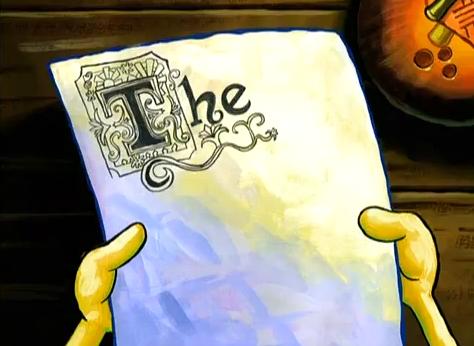Do you remember that episode of Spongebob
where he has to write a Boating School essay about stoplights? Or that other episode where he can’t answer
what he learned in Boating School? Yeah,
those were basically me writing the Module 1 journal article.
 |
| Procrastination at its finest. |
 |
| Crying because this feeling is all too real. |
I’ve never considered myself an amazing writer, but I at
least thought I was decent. I’m usually
able to sufficiently complete a humanities essay with the flourishes of
complicated language and obscure literary devices (has anyone heard of
charactonyms?). Of course I get
feedback, but it’s typically along the simple, vague lines of “show, don’t
tell” or “develop your argument even further”.
Nothing soul crushing, that’s for sure.
When the journal article assignment came along, I thought it
would be okay. Not a piece of cake, but
also not hair-pulling hard. I also told
myself that I wouldn’t procrastinate because something like this takes
time. I wouldn’t make those stupid
mistakes that actual journal articles make!
Psh, how could they ever make their figures so confusing? Why on earth did they think it was a good idea
to use volumes instead of concentrations?
I was confident that I could do waaaay better.
Nice try, Nicole.
(Let it be known that I am willingly admitting my flaws to
benefit others.)
I procrastinated. A
lot. In my defense, that week was super
busy for me, and the assignment got pushed down on my to do list. (I have this system in my planner where I
write everything with an open box next to it.
If I don’t do it, I write an arrow in this box to push it to the next
day. “20.109 report” had an arrow next
to it for 5 consecutive days!!!)
When I actually sat down to work on the assignment, I found
that my writing did not correlate at all with the ideas going through my
head. It all my sense to me and I knew
what I wanted to say, just not exactly how to say it. Plus, none of my humanities writing skills
came in handy here; scientific writing is so dry. At the end of my first round of writing, it felt like I just vomited a ton of science information onto the paper.
So Jackie and I edited and edited, and it (sort of) came
together. I thought we had come over
many obstacles and communicated our experiment.
And then we got our first draft back.
Noreen, I love you, but my heart died a little inside when a
saw a list of ~40 things to improve on.
Scientific writing is a lot harder than I thought.
Basically, I learned that my figures are terrible. My original method was to build my results
around them, rather than building them around the results. I also didn’t plan them in advance and
created them on the fly. In result, our
findings were fragmented and disorganized.
Plus, I had a lot of poor labeling that made sense to me but wouldn’t
make sense to readers.
I need to step out of my own head and view things like an
outside reader. I need to make things
clearer and super explicit; the results are the most important part of the
paper, so why did I make them a puzzle? It
all seems obvious to do these things before you begin writing; but once in
action you forget that other people don’t think in the same way as you.
With all this, I am determined to be a different, better
person for the Module 2 report. Please,
hold me accountable to this.
Here’s my list of advice for others (and my future self):
·
PLAN AHEAD: Please, please, please stop
procrastinating. Honestly, the
assignment isn’t so daunting once you actually begin it. Plus, you’ll have more time to think about
what exactly you want to say. It’s
better to complete things like this in tiny bits rather than one large,
sleepless, stressed-out, double expresso-shot chunk.
·
THINK ABOUT OTHERS: Like I said before, just
because something makes sense to you, doesn’t mean it will make sense to other
people. Make your figures clear and
concise. Make sure you help people
understand why you did something, what you expected versus what you found, and
why your project is important. Thinking
in a larger scope will make your writing acceptable in the eyes of others
rather than just yourself.
·
COME UP WITH A KILLER PLAYLIST: If you listen to
music while you work like I do, get some music to pump you up. Sometimes, I pretend I’m in the song (dorky,
I know) and it gets me motivated to keep going.
·
TAKE A DEEP BREATH: Assignments like these can
be extremely frustrating and seemingly fruitless. But we have to remember that we are students
who are learning and growing. It’s hard
now, but we’ll be so thankful that we’re making these mistakes.
I hope by seeing my struggles that others can take a little
bit away and apply my advice to other communication assignments. Lets hope that I can also take my own advice.
P.S. Don’t convince yourself that watching Frozen is more
important to your future career than the assignment. Trust me, it’s not impressive to employers
that you know all the words to “Love is an Open Door.”
No comments:
Post a Comment